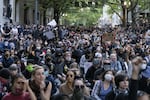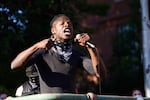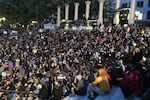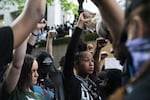Massive crowds gathered in Portland on Monday night for a fourth evening of protests over the killing of George Floyd, a Black man from Minneapolis who was killed after an officer pushed his knee into his neck for nearly nine minutes.
But unlike previous nights of protests, there was a limited police presence on Portland streets, and demonstrators remained peaceful throughout five hours of marching. During the night, protesters demanded leaders take action to address racial inequities and police violence.

Massive crowds gathered in Portland for a fourth evening of protests over the killing of George Floyd, a Black man from Minneapolis who was killed after an officer pushed his knee into his neck for nearly nine minutes on June 1, 2020. Unlike previous nights of protests, there was a limited police presence on Portland streets, and demonstrators remained peaceful throughout five hours of marching.
Jonathan Levinson / OPB
The evening's demonstration began around 6 p.m., with a gathering near Revolution Hall in Southeast Portland.
Speakers there talked about the deaths of Black Americans at the hands of police and informed the crowd about their legal rights during demonstrations.
"We all saw the video. We all know what is going on in America," demonstrator Lyfe Tavarres said at the gathering, referring to the video Floyd's death that has sparked a national outcry.
"We have a voice. We are the change," Tavarres said.

Lyfe Tavarres spoke to a crowd of Portland demonstrators Monday night, June 1. 2020, decrying racial injustice and the death of Minneapolis man George Floyd at the hands of police.
Jonathan Levinson / OPB
That message carried throughout the evening, as the organizers of the event — many of them young people of color — implored the group to stop anyone who seemed eager to cause vandalism.
At one point during the night, the crowd shouted down a person who tried to tear up an American flag at Pioneer Courthouse Square.
Much of the entirely peaceful protest took place after 8 p.m. when Mayor Ted Wheeler had renewed a third night of curfew for the city.
Portland leaders said the curfew was meant as a tool for police to use if necessary, but officers largely remained tolerant of people breaking the rule.
“I actually think we should be backing off on the curfew because clearly it is having the opposite impact we’re wanting to have,” Portland Commissioner Jo Ann Hardesty said at a press conference earlier in the day, noting people had shown up the previous night to oppose the restriction.

Massive crowds gathered in Portland for a fourth evening of protests over the killing of George Floyd, a Black man from Minneapolis who was killed after an officer pushed his knee into his neck for nearly nine minutes on June 1, 2020. Unlike previous nights of protests, there was a limited police presence on Portland streets, and demonstrators remained peaceful throughout five hours of marching.
Jonathan Levinson / OPB
After marching from Revolution Hall, protesters took to the Burnside Bridge — where hundreds of people lay face down on the pavement for nearly nine minutes in memory of Floyd.
Ahead of Monday's event, Portland police closed a large swath of downtown that encompassed the Multnomah County Justice Center and other buildings that had been the scene of tensions and damage over the weekend.
"The closure of this area is due to ongoing public safety concerns and ongoing criminal acts," PPB said in a statement. "Violations of this order may result in arrest."
A crowd of thousands of people eventually made their way to the Justice Center, where police over loudspeakers warned them to stay back. The demonstrators at times took a knee, raised their fists and held up peace signs. They called on the Portland police to open a dialogue and end a militarized police response that contributed to clashes at previous nights' protests.
By 9:30 p.m., a packed crowd filled Pioneer Courthouse Square, where more speeches took place and music played from loudspeakers.
"We have not witnessed any vandalism or destruction. This has been an hours-long protest that has remained peaceful. Thank you and we see you and hear you!" the Portland Police Bureau tweeted.

Demonstrators gathered in Portland for a fourth night of demonstrations over the killing of George Floyd.
Jonathan Levinson / OPB
Though the demonstration led by Black and brown Portlanders stayed peaceful, some demonstrators criticized how focused political leaders and media coverage has been on vandalism, rather than police brutality.
"When Colin Kaepernick took a knee in the NFL, they said, 'Don't do that, it's not the time or place,'" Portland resident John Johnson told OPB. "One by one, Black stars stood up and used their platform to speak their mind, and they said, 'That person should stick to what they do best.' ... So now we're out looting and burning things — that's also not the right way. So, which is the right way?"
The peaceful demonstration in Portland capped a day of similar actions across the state, as Oregonians in Medford, Hermiston, Pendleton, Eugene, Salem and elsewhere called for equality.
The lead up to Monday's demonstrations had seen considerable tension over whether Oregon Gov. Kate Brown would deploy the state's National Guard to help maintain order, as other states and cities have done.

Massive crowds gathered in Portland for a fourth evening of protests over the killing of George Floyd, a Black man from Minneapolis who was killed after an officer pushed his knee into his neck for nearly nine minutes on June 1, 2020. Unlike previous nights of protests, there was a limited police presence on Portland streets, and demonstrators remained peaceful throughout five hours of marching.
Jonathan Levinson / OPB
Though she said she wrestled with the decision,
Brown ultimately chose to send out 50 National Guard soldiers to Portland
. Their presence was not seen at Monday's demonstration.
The governor drew a distinction between her deployment of the National Guard and President Trump's calls for harsh crackdowns on protesters.
Actions of demonstrators made that distinction even more clear in Portland on Monday. As helicopters buzzed low over crowds in Washington, D.C., and police continued to deploy tear gas, Portlanders chanted "Say his name! George Floyd!" and danced to music across the Burnside Bridge before wrapping their protest before midnight.
“We are not entering martial law. We are not going to have armed people on every corner in the city of Portland. We will make sure that the space is there for people to exercise their Constitutional rights,” Hardesty said earlier in the day. “And I want to make sure we don’t forget why people are on the streets in the first place: People took to the street because people have enough of the inequality that African Americans experience in this country.”

Massive crowds gathered in Portland for a fourth evening of protests over the killing of George Floyd, a Black man from Minneapolis who was killed after an officer pushed his knee into his neck for nearly nine minutes on June 1, 2020. Unlike previous nights of protests, there was a limited police presence on Portland streets, and demonstrators remained peaceful throughout five hours of marching.
Jonathan Levinson / OPB